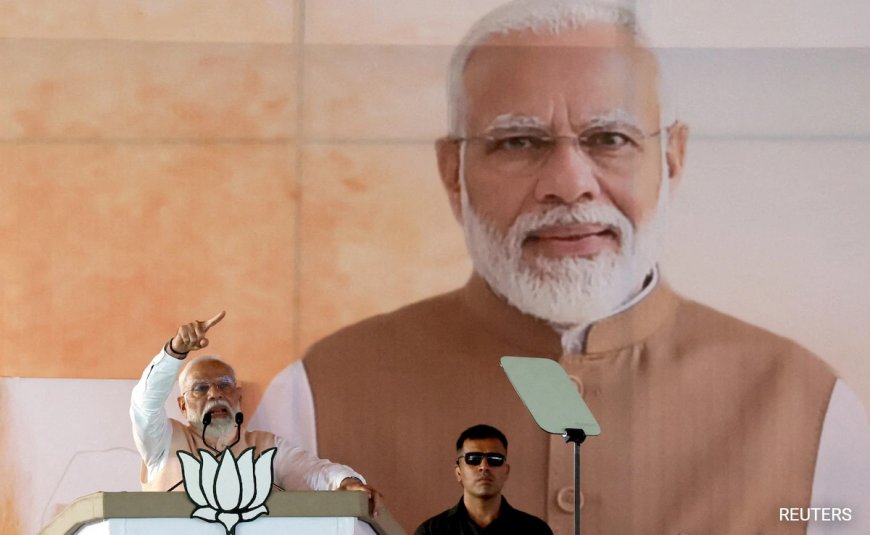India’s global role will grow in Modi’s third term

INDIA'S election, the world’s largest democratic exercise, may have delivered a stunning surprise by denying Prime Minister Narendra Modi’s party an outright majority in parliament. Still, this setback is unlikely to affect the stability or direction of his third-term government.
The primary reason is that the ruling Bharatiya Janata Party, or BJP, contested the election in alliance with several small political groups, with the coalition winning a majority of seats in parliament’s ruling lower house.
Still, the BJP’s loss of its commanding majority in the lower house represents a blow to Modi’s political standing, including puncturing his air of invincibility. After stacking up political win after win, an overconfident Modi had predicted even before the campaign formally began that the BJP would secure more than two-thirds of the seats in the lower house.
The BJP’s failure to win a simple majority on its own, however, is unlikely to have a direct bearing on Modi’s national agenda or foreign policy. The allied parties Modi will depend on are provincial groups with no national vision or ideas.
Moreover, while the fragmented opposition may have unified to stop Modi’s juggernaut in the election, it lacks a common agenda or leader, which raises the question of whether its unity will endure. In fact, the combined number of seats won by the multiple parties in the opposition coalition is slightly less than what the BJP secured on its own.
Modi, 73, is entering a second decade as prime minister, despite a strong anti-incumbency sentiment in Indian society. Only one other Indian leader, Jawaharlal Nehru, secured a third term decades ago.
Modi’s leadership has given India political stability, robust economic growth and accelerated military modernization. India’s international profile and geopolitical weight are rising, partly because the end of China’s economic boom has thrown into relief the emergence of Asia’s other demographic giant as a geopolitical and economic force. India is now the world’s fastest-growing major economy.
After the election results, Modi declared that his third term would represent a “new chapter of big decisions.” But, given India’s fractious politics, big decisions often tend to fuel division and polarization, especially when they challenge entrenched interests. In his second term, Modi, for example, was compelled to repeal farm reform laws after a year of opposition-backed grassroots protests.
With his pro-growth and pro-market agenda, Modi is aiming to transform India into a global manufacturing hub at a time when Western companies are interested in shifting production away from China. Consequently, his new term is likely to see greater government spending not just on manufacturing and infrastructure but also on human capital, particularly in education and training.
The new government will have to urgently consider the nation’s foreign policy challenges, above all the military standoff with China, which recently entered its fifth year. The tense standoff, triggered by furtive Chinese encroachments on some Indian borderlands, may not be grabbing international headlines, but China persists with a frenzied buildup of force deployments along the Himalayan border as if it is preparing for war. China recently deployed its most advanced J-20 stealth fighter jets near the Indian frontier.
India’s most pressing foreign policy challenges relate to its troubled neighborhood, not least a strengthening strategic axis between China and Pakistan, with both these nuclear-armed allies staking claims to swaths of Indian territory. India is already the world’s third-largest defense spender, behind the U.S. and China.
More fundamentally, Modi has helped shape a pragmatic foreign policy vision. Shorn of ideology, Indian foreign policy has sought to revitalize the country’s economic and military security while avoiding having to overtly choose one power over another as a dominant partner.
In practice, however, closer cooperation with the U.S. has remained Modi’s signature foreign policy initiative, despite some new irritants in the bilateral relationship, including the role of U.S.- and Canada-based Sikh militants.
While tilting toward the West, India remains loath to enter into a formal military alliance with the Western bloc. President Joe Biden’s reluctance to say anything on the Sino-Indian military standoff, let alone side with New Delhi, reminds India that it must defend itself all on its own.
India’s independent approach to international affairs is unlikely to change given that New Delhi believes in friendship without dependence. This makes India the world’s ultimate “swing state” in the current transition from the post–World War II American-led order to a new global order whose contours are still not clearly visible.
In contending with China, its sole challenger at the global level, the U.S. needs a degree of adaptability in forging partnerships, instead of hewing to the Cold War–style “us versus them” approach. A country as large as India cannot become just another Japan or Britain to America. Yet no anti-China alliance can play a strategically meaningful role without India, which has locked horns with the Chinese military in a way no other power has done in this century.
To be sure, India’s size and diversity pose enormous challenges. It is now the world’s most populous nation and is demographically and culturally very heterogeneous.
Still, as the latest election highlights, India’s democratic framework serves as a pillar of inclusion, stability and strength. By empowering people at the grassroots level through participatory processes and open dialogue, the Indian political system has enabled members of historically marginalized classes and castes to gradually gain prominence in politics and bureaucracy. Modi’s own humble beginnings illustrate this.
India today is an ascendant global player, and Modi’s focus in the third term will likely be on enabling India to play a bigger role on the world stage. India’s accelerated rise will not only increase its salience in the global balance of power but also help advance American goals in the Indo-Pacific region, the world’s new economic and geopolitical hub.
BY BRAHMA CHELLANEY, The Hill
